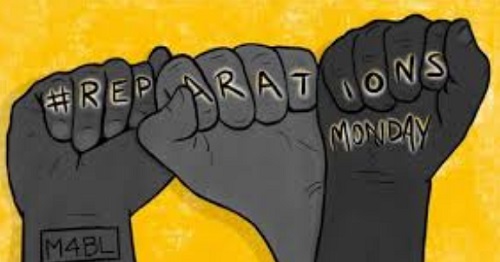With calls for reparations from Western powers to Africa growing by the day, the time for adequate compensation for the centuries of slavery and other injustices cannot be further delayed.
Rather than the usual lone, odd voice pleading from a distance, Africa now seems more united than ever in the demand for reparative justice for centuries of slavery, colonisation and other dehumanising experiences endured by the continent and its people from Western powers.
Various advocates have put the worth of reparations due Africa at trillions, with Lynsey Chutel of the New York Times referencing a Ghanaian academic, Daniel Tetteh Osabu-Kle, in a 2000 article published in the Journal of Black studies which put the figure at $100 trillion.
Kwesi Pratt Jnr, who is a member of the Coordinating Committee of the Pan-African Progressive Front, estimates in his book on reparations that Africa could be due a conservative figure of more than two trillion dollars for the 12.5 million Africans forcibly taken during the transatlantic slave trade spanning the 15th to 19th centuries.
He argued that, if 12.5 million Africans worked an average of 10 years without pay and earned a modest historical wage equivalent of $5/day, the amount is over $2 trillion, excluding interest or compound growth.
Writing on “What is Africa owed”, Chutel stated that: “Approximately 12.5 million people were enslaved and taken from Africa, according to a widely accepted figure from the Trans-Atlantic Slave Trade Database, but some estimates argue that as many as 20 million people were enslaved”.
Renowned economist Utsa Patnaik argues that Britain extracted $45 trillion from India between 1765 and 1938.
Marchal, a Belgian scholar, also estimates that in Congo under King Leopold II, 10 million people died between 1885 and 1908, while Belgium's profit from this period amounted to $1.1 billion in today's value.
while Africa is yet to receive its due for suffering slavery, colonization and other injustices, the West has made some efforts towards some other people.
For example, Germany has paid out $89 billion in reparations for the Holocaust (since 1952), while the United States has paid $1.6 billion to Japanese Americans interned during World War II.
But France has compelled 14 African countries to hold – in CFA franc – 50 per cent of their reserves totalling $500 billion in Paris.
Although some efforts have been made towards reparations to Africa, the volume of it has been woefully inadequate when compared to what the continent actually deserves.
For example, Germany agreed to pay €1.1 billion to Namibia for the genocidal atrocities on the Herero and Nama people through their descendants in 2021 in existing aid programmes to be delivered across 30 years, while the UK gave £20 million to Kenya for victims of the Mau Mau uprising.
Then again, these sums are insignificant for Africa. For example, £20 million for Kenya translates to just £3,500 per survivor.
In a May 2025 article published by the United Nations, Cristina Duarte, a Cabo Verdean former Minister of Finance, Planning and Public Administration who now serves as Special Advisor on Africa to the UN Secretary-General, António Guterres, wrote that Africa's call for reparations is "not just for reflection, but for clarity, courage, and a strategic reframing of the reparations discourse".
She described the African Union theme for 2025, framed as: “Justice for Africans and People of African Descent Through Reparations” as "a powerful and necessary theme".
She then justified Africa's demand for reparative justice by emphasising that the continent has become "a net creditor to the world, losing more than $500 billion every year through illicit financial flows, unfair trade practices, exploitative investment frameworks, and debt servicing, while it is home to some of the world’s poorest populations".
For instance, she recounted, that Ghana exported $9.58 billion in gold in 2024, yet it only retained 14 per cent of the value due to the nature of multinational agreements; that the DRC produces over 70 per cent of the world’s cobalt, yet only one per cent is refined in the country before being exported; that Zimbabwe was ranked as the third-largest producer of chromium in 2023, yet most was exported in raw form; that collectively, West Africa produces 70 per cent of the world’s cocoa beans but contributes less than one per cent of the global chocolate market, while in Somalia, illegal, unreported and unregulated (IUU) fishing by foreign fishing fleets costs the economy $300 million a year.
With important voices such as Ghana’s President, John Dramani Mahama, taking a front seat role in championing the subject of reparations to Africa, the effort might take a better turn this time.
At the 13th AU High-Level Delegation Dialogue on Democracy, Governance and Human Rights held in Accra on Tuesday, July 29, 2025, President Mahama urged African leaders to empower the appropriate bodies and institutions with resources to pursue the reparations agenda.
The negotiations could make it easier for the West to handle the subject. For example, Africa could be forgiven all of its debts to give the continent a fresh slate to “start life”.
As Chutel referenced to a group of eminent Africans, including Ali Mazrui, in her article: “Reparations from Western countries meant reducing their support for African tyrants, supporting democracy on the continent, giving African states a louder voice in international organizations, and canceling their debt”.
Those were profound suggestions considering the fact that Ghana, for instance, spent up to 30 per cent of its national budget in 2024 to service foreign debts instead of building schools and hospitals.
Africa deserves its compensation to begin its life afresh.

